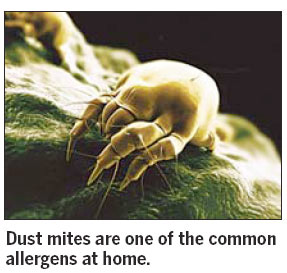Sleep tight, don't let bed bugs bite
There is no way for someone with allergies to avoid mites because they are simply everywhere. But there are modern preventive steps to take that go beyond protective clothing and regular washing of bed linens.
"Mites have been part of humanity's surroundings since the start of time and have nothing to do with bad hygiene," says Dirk Petersen of Hamburg's consumer advice center.

The mites are generally harmless to those without allergies. It's different for people sensitive to household dust, since that allergy is caused by the dung of the mites living in the dust, explains Anja Schwalfenberg of the German Allergy and Asthma Association DAAB.
The balls of dung dry out and break into smaller pieces, which bind to the house dust. That's then breathed in, sometimes leading to allergic reactions.
Mites like to live in beds, where it's nice and warm and a little damp, according to Stiftung Warentest, a consumer products tester. There they can also find plenty of skin flakes, their preferred meal. That means it's impossible to avoid the reality that up to 1.5 million of the small animals might live in any given bed.
Studies have shown that a mattress reaches its high mark for allergens after seven years, which is why Stiftung Warentest recommends replacing mattresses every seven to 10 years. Schwalfenberg agrees that "cleaning the bed is the most important therapeutic measure".
People suffering from allergies should use allergen-resistant encasings and regularly change their covers and linens, washing them at 60 C at least. In cases of serious allergy, it might be advisable to use anti-allergenic covers between different bed layers.
But most people don't realize they regularly perform an action that promotes mites.
"A properly made bed makes it easier for the mites to survive," says Schwalfenberg. That's because perspiration that accumulates overnight cannot properly dissipate under the folded bed clothing. Plus, the high humidity under the covers and the mattress is retained."
That's why people should air out the covers and the bedroom directly after waking. Mattresses should be left bare, giving moisture a chance to fade away.
Allergy sufferers used to be advised to get rid of carpets and to have bare, easy-to-wash floors. "This advice can't be given in general any more," Schwalfenberg says.
That's because smooth floors are only better for allergy sufferers if those floors are mopped at least every other day.
"Carpets and carpeting can even have advantages for people with house dust allergies," says Ernst Schroeder, chief of the German Carpet Research Institute. That's because the dust found in every home eventually sinks to the ground and can get trapped in the fibers of the carpet.
That means dust concentrations in rooms with carpeting are much lower than in rooms without.
















